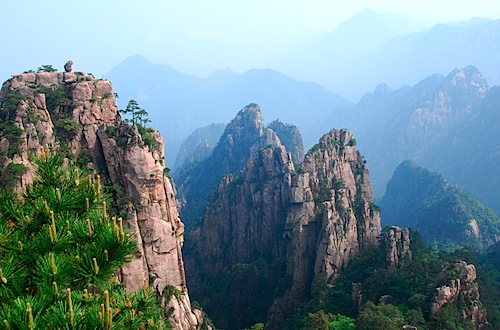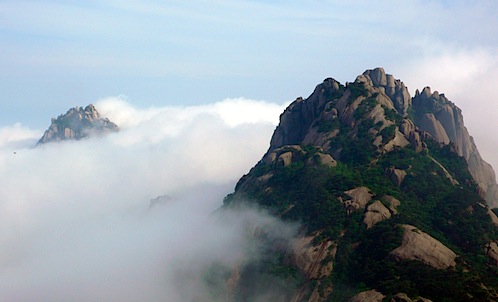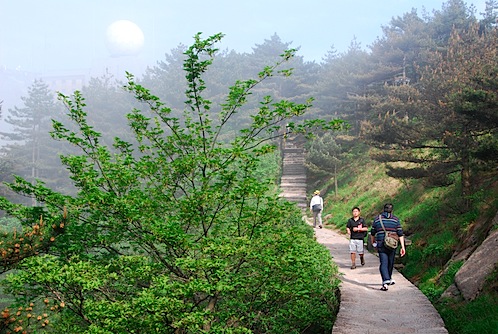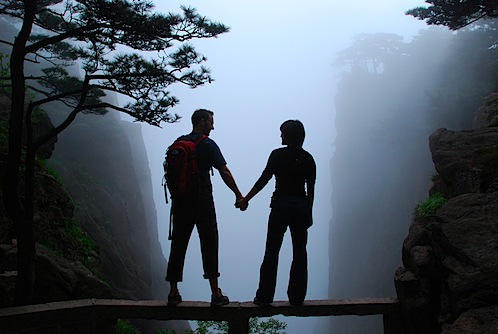Note: Hey everyone, let’s give a warm welcome to Eddo! My little bro shares his thoughts as the family travels Huangshan…I love that even though this post is about a mountain, he manages to nerd out on urban planning. Kudos, Eddo! ![]()
As an urban planning nerd/activist, I’ve always been interested in the growth and history of cities. Why did this particularly scenic peninsula morph into modern-day San Francisco? How did the end of the Mississippi River support a multi-ethnic creole population like New Orleans? How did two tiny islands in the middle of the Seine River become a focal point for a global city? How did civilization in the past evolve into its current form, and how do our actions today determine tomorrow’s society?
Anyways, enough of this urban speculation—I promise I’ll get back to it later—let’s get to the heart of this entry. Huangshan (in English, “Yellow Mountain”) is located in the Anhui province of China, and is a major mountain range which has been opened up for tourism. It has inspired countless Chinese poems, literature, and paintings, and deservedly so, because it is one of the most scenic and beautiful places I’ve ever personally experienced.

Monkey Rock (the little rock perched on top of the huge stone on the left) overlooking the Valley.
I’ve never been to China before, let alone Huangshan. The last time I was remotely close to China was probably when I was 6 or 7 years old, and was in Taiwan for my Da Jo Jo’s and Da Jo Ma’s wedding. I don’t really recall much from that time, except I liked riding on my youngest uncle’s motorcycle/scooter, and that it was really hot. So for me, Huangshan was not only an eye-opening experience, but also my introduction to China.
China’s problems with rapid modernization and urbanization are well-documented, and I don’t think I need to go into too much detail, but to be introduced to China via its rural and agricultural communities, is, in a word, refreshing. We in America like to glorify a simpler time—when seasonality and locality weren’t just buzzwords for haute cuisine, when communities and societies flourished not because of economic indicators like GDP and inflation rates, but instead on the reliance of individuals in each community to provide a good or service necessary to its citizens. And this is what China is about, I think. Despite its rapid modernization, at the core of all production is people—roads are created by people moving around rocks in wheelbarrows, crops are planted by people leading water buffalo through a field. The concept of labor here is unlike America, where machines have taken over the most difficult of tasks. If there is a resource that China has utilized more so than any other country, it is its people. Performances like the Beijing Olympics Opening Ceremony requiring massive amounts of people, control, coordination, planning, and creative vision, could not have happened anywhere else in the world. Of course, this is both a positive and negative—things are built or created at a frenetic place, but the value of human labor is less than in other countries and services rendered by humans cost exponentially less than anywhere in the West. People are valued less as specialized individuals as they are cogs in a well-oiled economic machine.

Huangshan’s famous “cloud ocean.” It literally moves in and out in minutes.
Walking through Huangshan is a series of stone steps and pathways meandering along streams, cliffs, forests, and valleys. It is stunning. But you do get a sense of devaluation of individual labor. Couriers or porters carry up all goods that are used by the hotels at the top of the mountains (Ed. note: Indeed, supplies are not allowed to be hauled up the mountain on the gondola—even though it is surely cheaper to mechanize the delivery of these goods—in order to create jobs for local farmers who otherwise wouldn’t be able to earn a decent wage), luggage from tourists, and in some cases, people who cannot walk up or down the grueling paths of the mountain. It is incredible—I can’t imagine the amount energy or labor involved. They get paid by the kilo, and generally balance inhuman amount of goods on a single bamboo stick on their back. Our tour guide told us that they can make up to 1,000 RMB a month (around US$150) which is actually a decent salary in their area. Individuals who work in the hotels on the top of the mountain stay up there for three months at a time, and get free room/board while earning salary.
I don’t know how old the trails and steps of Huangshan are, but one does get a sense of how civilization and societies emerged in the olden days. Locations were picked based on geographic resources, and paths were then created to connect major population centers with each other. Much like cities in America developed along the Mississippi River from Chicago down to New Orleans due to geography and natural resources, I imagine this is how “cities” developed in Huangshan. Except in Huangshan, these “cities” are essentially outdoor plazas with hotels and restaurants, instead of actual cities. But these gathering places and webbed network of paths towards peaks and valleys and sights are in a sense, a microcosm of China, where cities are connected to each other by a network made up of boats, rail, roads, and planes rather than stone steps.

Eddo hiking towards the giant golf ball (on the left, in the background), a weather station located at Huangshan’s highest point.
Huangshan, much like the rest of China, encompasses a scale that I can barely comprehend. It is stunning. It is dramatic. It is imposing and it is spectacular. It is filled with jagged peaks, intense sunrises (which we woke at 4:30 for, climbed up a mountain and after concluding we wouldn’t see it, started hiking back down the mountain, only to see the sun peak through the trees, d’oh!), and ancient trees and wildlife. The Chinese have a saying that Huangshan is number one—after experiencing Huangshan, you need not experience any other mountains. My mother, who was also experiencing China for the very first time (she was born in Taiwan and because of China’s irregular rules on tourism during the Mao era, she hasn’t been able to visit until China became more open in the years after Mao’s death and China’s embrace of capitalism) celebrated her birthday on top of Huangshan. She said “I had always heard of Huangshan ever since I was a little girl but was never able to experience it firsthand until now. I cannot believe that I am celebrating my birthday here. I am so happy.” I think we’d all agree—there is no experience like Huangshan in the world, and despite what you may think about China politically, Huangshan is not just a Chinese treasure, but a treasure for the world.

P.S. Here is a link to Eddo’s photos of Huangshan on his Facebook.
Great insight, Eddo. And beautiful photos.
So nice to see the whole family touring together. Must be a real treat for Hope and Jeremy after so much time exploring on their own.
I would expect the majesty of china — its scenery & its history would move you no less than it did. It’s really amazing to (finally) get up close in situ to a culture that has some personal connection to one’s own ancestry. Nice post, Ed. Also, because I am a textile-phile and ancient crafts know-it-all, consider how important & significant the rag trade was to cultural cross-pollination, development of villages, and general development of civilization. Textile-making is not just the oldest form of technology, it is also a great illuminator of social, economic, and cultural history. I mean, i just thought you might find it interesting since you’re an urban planning nerd =)
It truly was a dream come true for me, HuangShan is somewhere I heard a thousand times when I was young, but imposible to reach because of the iron curtain. Now I am here with my dear family, seeing the everchanging foggy mountain, step on the dirt with my own feet, getting a feel of people who lives in,work or near the majestic place.(even a tour guide looks just like Philip Li,son of my best fried Grace). On the day we came down from HuangShan is happen to be my bithday, I stop to deeply breath in the sweat air, memorize the trees and flowers and sound or quietness of the serene suroundings. Thanks Jack, Hope,Jeremy and Eddo, it is a most memorable bithday of my life.
Thanks for the comments everyone! I am still basking in post-China glow!!!